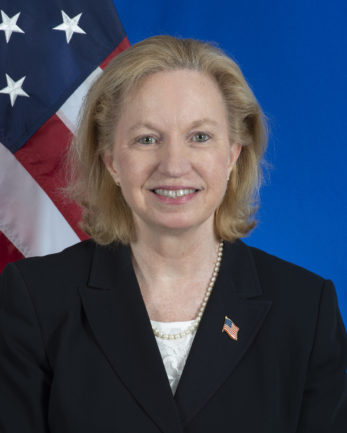US Ambassador to Guyana Sarah-Ann Lynch yesterday defended statements by her and high-level State Department officials calling for a credible vote count here as upholding “bedrock” principles of good governance and practising good diplomacy.
In an unusual statement which signalled that Washington would not back away from pressing for a free and fair election result from the bitterly contested March 2 general elections, Lynch also cited Guyana’s criticism in January last year of Venezuela’s election as an example of Georgetown’s support for such interventions.
She urged that Guyana remain in good standing by counting all of the election day results in “a transparent and credible process”.
Since March 2nd there have been a stream of statements from Lynch, US Assistant Secretary for Western Hemisphere Affairs, Michael G. Kozak and US Secretary of State Mike Pompeo calling for an accurate tabulation of results and warning that any government sworn in on results that were not credible would not have legitimacy.
In her statement yesterday, Lynch said that a common criticism of diplomatic commentary during politically charged election periods is that they amount to “foreign interference.” But in foreign policy, she contended that the difference between meddling and practising good diplomacy is that the latter involves sticking to bedrock principles of human rights, good governance, and transparency and, whenever possible, emphasizing the values that bind the country you represent to the country in which you serve.
“Quite properly, there has been a lot of attention by U.S. diplomats to Guyana’s 2020 election day and events after it. In this context, silence breaks an oath I took. In serious and soaring language, I swore to `bear true faith and allegiance’ to the Constitution of the United States, and it is in that document where these bedrock principles stand solidly for me. Indeed, 11 of the 27 amendments to the U.S. Constitution address voting rights, electoral issues, or matters of succession by our representatives”, she declared.
She noted that the international extension of these principles is present in the Universal Declaration of Human Rights of 1948. She pointed out that Article 21 underscores that, “Everyone has the right to take part in the government of his country, directly or through freely chosen representatives.” She added that it makes clear that the “will of the people shall be the basis of the authority of government.” In the Americas, she pointed out that Article 3 of the Charter of The Organization of American States correctly observes that solidarity among the American States requires “the political organization of those States on the basis of the effective exercise of representative democracy.” The Guyana Constitution, she said, also underscores democratic principles.
“Guyana has displayed its leadership in defense of representative government recently by joining other Lima Group members from the Americas to strive for a democratic resolution to the crisis in Venezuela. Along with 12 other countries, Guyana proclaimed in January 2019, `We reiterate that the electoral process that took place in Venezuela on May 20, 2018, lacked legitimacy as it neither included the participation of all political actors in Venezuela, nor did it have the presence of independent international observers, nor did it comply with the necessary guarantees or international standards for a free, fair and transparent election. Accordingly, we do not recognize the legitimacy of the new presidential term of Nicolas Maduro, or his regime, which commences on January 10, 2019.’” Such statements, she said, are not foreign interference, they amount to good diplomacy by members of the hemisphere’s democratic club.
In unusually blunt language, she said “My hope and expectation is that Guyana maintains its good standing as a member of this club by counting all the election day votes through a transparent and credible process. Guyana is certainly not Venezuela; let’s keep it that way”.
In her statement headed `U.S. Diplomats: Why We Champion Democracy’, Lynch said that
some have criticized the U.S. Government for speaking out, suggesting it would do better to get its own house in order.
“To that I respond, democracy, or rule by the people, is almost always noisy. The democratic cacophony is home to our competing values and political identities in the public square. At its heart, democracy is the expression of our freedom to be represented. As such, each adult citizen must have one vote and each vote must have one value.
“I will close by sharing an apparently well-kept secret: The United States Government is entirely non-partisan about which party wins Guyana’s 2020 elections. The major parties – and the smaller ones too – all offer the opportunity to continue an excellent bilateral relationship based on a shared commitment to supporting improved governance, prosperity, and security in Guyana. Let’s get on with that important work”.





